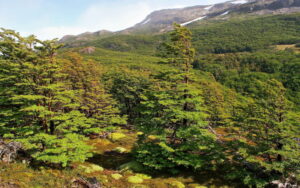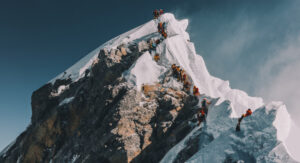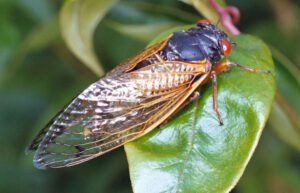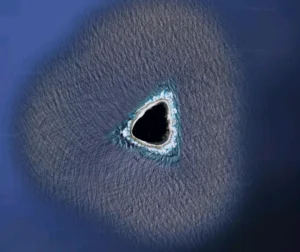The current winter season in the Karakorum has ended with no summits. A crevasse fall put an end to Simone Moro and Tamara Luger’s attempt on Gasherbrum I, a mix of miscalculations, health issues and bad luck thwarted Mingma G’s K2 expedition (watch for a detailed report soon) and pneumonia defeated Don Bowie on Broad Peak.
After Bowie left, the craziest yet most powerful hope for the season rested on his expedition mate, Denis Urubko, who chose to stay and launch a nerve-wracking, solo attempt up the 8,051m mountain. It was dangerous, true, but Urubko is accustomed to trying the impossible and returning alive. And so he did this time, as well.
Urubko returned without the summit but he seems to be the only one who really minds, as shown in the video below.
Meanwhile, the climbing community was simply relieved that he survived. We all wanted, especially, to hear his story, and in his peculiar, distinctive style, Urubko obliged.
Weather forecasts were, according to Urubko, “unpredictable, unstable and illogical.” He finally set off on February 16 at 6:30am — and was caught in an avalanche and dragged 100m down a couloir shortly afterwards. “It did not stop me, though, I just shook the snow off my jacket and continued up,” Urubko said.

Urubko was in pain after being swept down by a slide but kept going as if nothing had happened. Photo: Denis Urubko
He continued up quite fast, and by 15:30 he had set up Camp 3. Everything was fine, although he noted that the “sensibility was strange.”

Urubko’s Camp 3 with a view — to K2. Photo: Denis Urubko
At 3am the following day, Urubko left for the summit of Broad Peak as planned, but a rope “refused to work correctly,” and he fell 15m, landing close to a crevasse. “But even that did not kill my optimism: I just chose another rope and went on.”
When he reached 7,400m, however, “I just discovered situation of wind 40kph… was in MILES. Mountain voiced above me. Surprise? No, just reality. Meaning of the situation was — one more mistake and GAME OVER. So I turned back, and at about 10:00 arrived in BC.”

Shadow-selfie. Photo: Denis Urubko
As Urubko told his wife, Maria Cardell, on the phone, he was bruised but fine to trek back to Skardu on his own. But neither Cardell in Spain nor his friends in Pakistan — journalist Karim, Brigadier Rashid Ullah, mountaineer Nazir Sabir and, most of all, General Khalil — were ready to let him go on foot. Khalil sent the Askari Aviation pilots hurrying in their helicopter to the Baltoro, with orders to bring back the climber to Skardu and “accept no excuses” whatsoever.
“And this is how, in one day, I jumped from 7,400m to 7,400 feet,” said Urubko. With his own military background, Urubko felt genuinely honored to be carried out as a soldier from the field and spared no words of praise for the pilots, the locals and Pakistan as a whole, “a country with a great mountain culture.”
And now, what?
That’s the most asked question for Urubko’s fans. At the beginning of the season, some hoped that he would not only summit Broad Peak, but then move on to the ultimate winter challenge of K2. Now that this option is discarded, and that K2 still waits for its first winter summit, there’s a great opportunity for the Russian-born superstar to prepare for this goal in 2021.
But the climber worried his fans before his Broad Peak expedition, when he said that he would retire from 8,000m mountaineering and focus on rock climbing instead. He has further stoked rumors of his “professional re-invention” when he mentioned that he now doesn’t eat breakfast because he is on a diet “to climb 8a (5.13b) for the next 5-6 years!”
Blogs worldwide are now freaking out over that sentence. Urubko himself has confirmed that he has renounced “risky mountaineering” and will focus instead on rock climbing and hiking. It will be interesting so see how the 46-year-old climber evolves, and which type of rock climbing he comes to prefer — or whether he will change his mind again.
On a personal note, I can’t help seeing a resemblance between Denis Urubko and bullfighters in my home country of Spain. Without entering the ethical debate around this controversial activity, the fact is that bull-fighting is risky, and devotion to it requires a great state of fitness, years of technical practice and experience and a very special perception of risk and pain.
Most bullfighters retire quite young, if they’re lucky enough to get the chance to retire at all. The most successful ones hang around a bit longer, though. They would rather say goodbye only under family pressure, because of clear physical decay or an opportunity to change fields without losing the attention and money they’ve become accustomed to.
However, many of them prove incapable of sticking to their promise. Through one excuse or another, they end up back in the arena. Money is often part of it, but it’s never just that. They also crave the raw, intense feelings and adrenaline. Maybe Denis Urubko will also come to miss the scent of danger, not from a magnificent 600kg creature, but from the wildest mountains of all.






